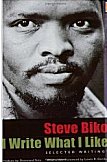

In his writings, he notes that ‘ people without a positive history is like a vehicle without an engine’.Ī necessary step towards restoring dignity to Black people, according to Biko, involves elevating the heroes of African history and promoting African heritage to deconstruct the idea of Africa as the dark continent. His philosophy casts a positive retelling of African history, which has been heavily distorted and vilified by European imperialists in an attempt to construct their colonies. The movement viewed the liberation of the mind as the primary weapon in the fight for freedom in South Africa, defining Black consciousness as, first, an inward-looking process, where Black people regain the pride stripped away from them by the Apartheid system. ‘Black’ as defined by Biko was not limited to Africans, but also included Asians and ‘coloureds’ (South Africans of mixed race including African, European and/or Asian origin), incorporating Black Theology, indigenous values and political organisation against the ruling system.

The Black Consciousness Movement centred on race as a determining factor in the oppression of Black people in South Africa, in response to racial oppression and the dehumanisation of Black people under Apartheid. Credit: South African History Online via Wikimedia Commons CC BY-SA 4.0. Biko’s philosophy focused primarily on liberating the minds of Black people who had been relegated to an inferior status by white power structures, seeing the power struggle in South Africa as ‘a microcosm of the confrontation between the third world and the first world’. He had witnessed police raids during his childhood and lived through the brutality and intimidation the Apartheid government was known for. SASO was a direct response to what Biko saw as the inaction of the National Union of South African Students in representing the needs of Black students.īiko’s experiences under Apartheid drove his philosophy and political activism. He later founded the South African Students Organisation (SASO) in 1968, in an effort to represent the interests of Black students in the then University of Natal (later KwaZulu-Natal).

Born 18 December 1946, Steve Biko was a South African activist who pioneered the philosophy of Black Consciousness in the late 1960s.


 0 kommentar(er)
0 kommentar(er)
